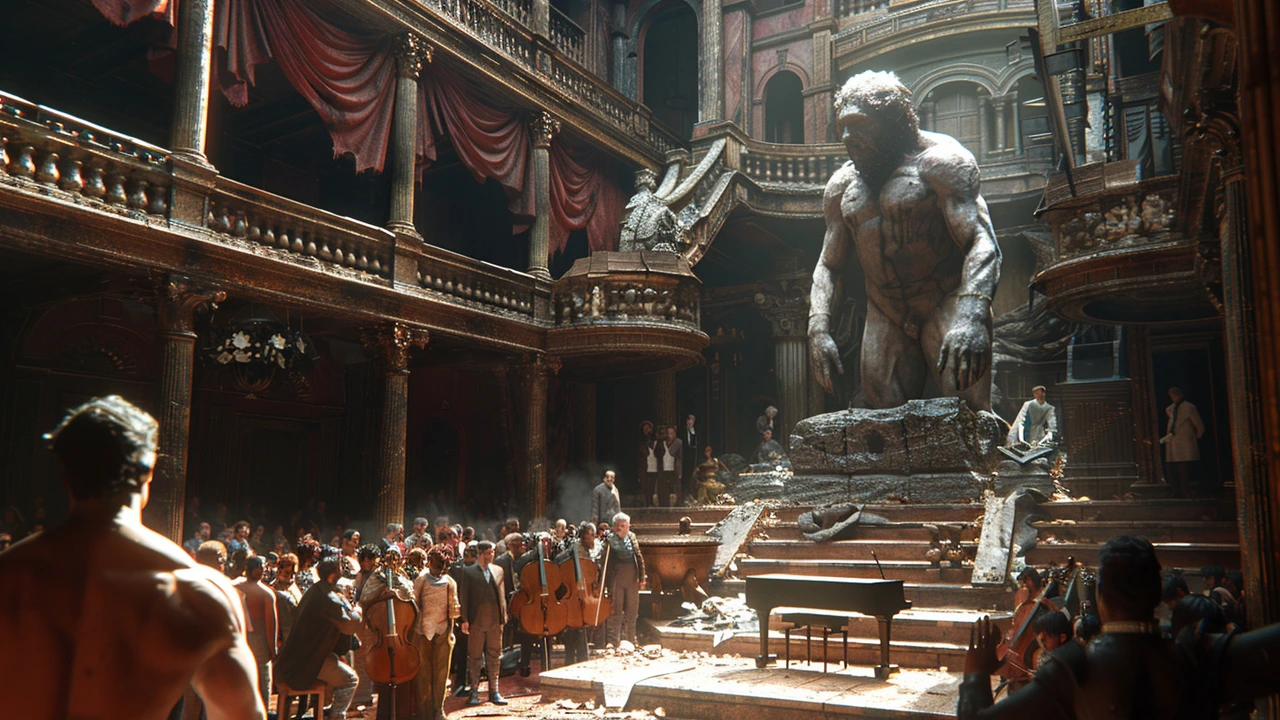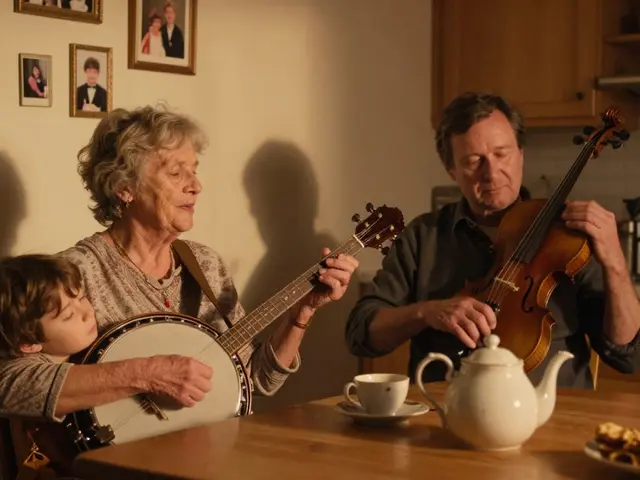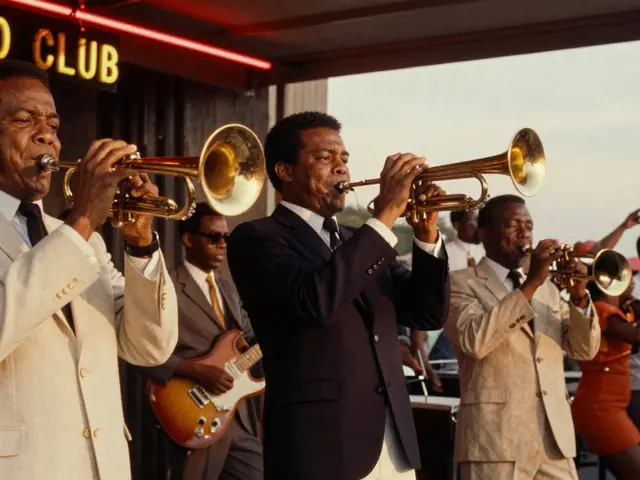The timeless beauty of classical music lies in its rich history and profound impact. From the intricate compositions of Mozart to the emotional depth of Beethoven, classical music continues to enchant listeners around the world.
This genre is not just about the notes or the melodies; it's about the stories they tell and the emotions they evoke. It's a journey through time, offering a glimpse into the artistic expressions of past eras.
Whether you're a seasoned enthusiast or a curious newcomer, exploring classical music can be an enriching experience. Let's dive deep into this mesmerizing world, uncovering the secrets and the magic that make classical music an eternal treasure.
- Introduction to Classical Music
- Historical Roots and Evolution
- Famous Composers Who Shaped the Genre
- The Universal Appeal of Classical Music
- Practical Tips for New Listeners
- Modern Influence and Adaptations
Historical Roots and Evolution
The roots of classical music extend deep into human history, intertwining with the cultural and social developments of various civilizations. The term "classical music" often refers to the vast body of works produced in the Western tradition over several centuries, but its origins can be traced even further back to ancient Greece and Rome. During these early periods, music was an integral part of society, with instruments like the lyre and aulos accompanying theatrical performances and religious ceremonies.
However, classical music as we know it began to take shape during the medieval period, roughly from the 5th to the 15th centuries. This era saw the rise of Gregorian chant, a form of plainchant named after Pope Gregory I. These monophonic melodies were a significant part of religious services and set the foundation for more complex musical structures to come. It was during this time that musical notation also began to develop, allowing compositions to be more accurately recorded and preserved.
The Renaissance Breakthrough
The Renaissance, spanning from the 14th to the 17th centuries, was a period of rebirth and renewed interest in the arts and sciences. Music from this era saw a surge in innovation and creativity. Composers such as Josquin des Prez and Giovanni Pierluigi da Palestrina began experimenting with polyphony, where multiple independent melody lines were played simultaneously. This era also witnessed the birth of secular music, as composers started to create works for entertainment outside the church.
"To not know what happened before you were born is to remain forever a child." - Cicero
The Baroque period, from the late 16th century to the early 18th century, brought about some of the most dramatic changes in the musical landscape. It was an age of extravagance and artistic exploration. Composers like Johann Sebastian Bach, George Frideric Handel, and Antonio Vivaldi pushed musical boundaries with their intricate and expressive compositions. The development of opera, a dramatic form that combined music, theater, and visual art, revolutionized the way stories were told through music.
The Classical and Romantic Eras
The classical era, which spanned from the mid-18th century to the early 19th century, emphasized clarity, balance, and form. The works of composers like Wolfgang Amadeus Mozart, Ludwig van Beethoven, and Franz Joseph Haydn epitomized these principles. Large orchestras became commonplace, and the symphony and sonata forms were perfected. Beethoven, in particular, served as a bridge to the Romantic era by infusing his music with profound emotional depth.
From the 19th century onwards, the Romantic era exploded with individuality and expressiveness. Composers like Franz Schubert, Johannes Brahms, and Pyotr Ilyich Tchaikovsky focused on conveying deep emotions and telling personal and national stories through their music. This era also saw the rise of virtuosic performers who dazzled audiences with their technical prowess, exemplified by the likes of Franz Liszt and Niccolò Paganini.
The evolution of classical music didn't stop there. Entering the 20th century, composers began to experiment even more boldly with tonality, rhythm, and structure. Innovators like Igor Stravinsky, Arnold Schoenberg, and Béla Bartók challenged traditional notions of what music could be, leading to new movements such as atonal music, serialism, and expressionism. This era gave us a rich and diverse landscape of modern classical music, encapsulating everything from minimalism to electronic compositions.
The historical journey of classical music is a testament to human creativity and the enduring power of musical expression. Each era, from the medieval to the modern, has added its own unique voice to the grand tapestry. The legacy of classical music continues to evolve, influencing contemporary genres and captivating audiences with its timeless beauty.
Famous Composers Who Shaped the Genre
When discussing classical music, certain names inevitably rise to prominence. These composers are revered not just for their technical prowess, but for their unique ability to convey deep emotions and tell stories through their compositions. Let's embark on a journey through time to celebrate these maestros who undeniably shaped the genre.
Johann Sebastian Bach
Bach, often regarded as one of the greatest composers of all time, was born in 1685 in Germany. His music is characterized by its intellectual depth, technical command, and artistic beauty. Bach's compositions, such as 'Brandenburg Concertos' and 'Mass in B minor,' are exemplary of the Baroque period. He was also a highly skilled organist and his works for the instrument remain a fundamental part of the repertoire.
"Music is an agreeable harmony for the honor of God and the permissible delights of the soul." - Johann Sebastian Bach
His music continues to inspire countless musicians and composers. The complexity and beauty of his work make it a subject of study and admiration even today.
Wolfgang Amadeus Mozart
Born in 1756, Mozart was a prodigious talent, composing from a very young age. By the time he was an adult, he had created a staggering number of works, including operas, symphonies, chamber music, and more. His compositions, such as 'The Magic Flute', 'Eine kleine Nachtmusik', and 'Requiem', showcase his remarkable ability to blend beauty and technical precision.
"I pay no attention whatever to anybody’s praise or blame. I simply follow my own feelings." - Wolfgang Amadeus Mozart
Mozart's music is often described as the epitome of the Classical style. His work has influenced countless operatic and symphonic traditions and continues to move audiences worldwide. His life, albeit short, was a testament to his immense talent and unwavering passion for music.
Ludwig van Beethoven
Beethoven's influence on classical music is immeasurable. Born in 1770, he broke the conventions of his time and paved the way for the Romantic period. His compositions, such as 'Symphony No. 9', 'Fur Elise', and 'Moonlight Sonata', are legendary. What sets Beethoven apart is his ability to infuse his works with profound personal expression.
"To play a wrong note is insignificant; to play without passion is inexcusable." - Ludwig van Beethoven
Despite facing the debilitating challenge of hearing loss, Beethoven continued to compose some of the most moving and impactful pieces. His resilience and genius have made him a symbol of artistic determination.
Pyotr Ilyich Tchaikovsky
Tchaikovsky, one of the most prominent Russian composers of the late 19th century, brought a new emotional depth to classical music. His works, such as 'Swan Lake', 'The Nutcracker', and '1812 Overture', are celebrated for their orchestration and emotional intensity.
"Inspiration is a guest that does not willingly visit the lazy." - Pyotr Ilyich Tchaikovsky
Tchaikovsky's music is characterized by its vivid storytelling and lush melodies. His ballet scores are particularly beloved, and they continue to be performed regularly around the world.
Claude Debussy
Debussy, born in 1862, is often associated with the Impressionist movement, though he himself disliked the term. His music evokes a sense of atmosphere and mood rather than traditional structures. Pieces like 'Clair de Lune' and 'La Mer' are perfect examples of his innovative use of harmony and texture.
Debussy's work marked a significant departure from the norms of his time, and his influence can be seen in many 20th-century compositions. His ability to paint musical pictures has left an indelible mark on classical music.
These composers, among many others, have left us with a rich legacy of music that transcends time. Their works continue to be studied, performed, and loved by people all over the world, proving the enduring power of classical music.
The Universal Appeal of Classical Music
Classical music holds a unique place in the world of art due to its universal appeal. Despite originating centuries ago, it continues to captivate audiences of all ages across the globe. But why does this genre resonate so deeply with so many? One reason is the emotional depth and complexity found in classical compositions. These pieces often explore a wide range of human emotions, from joy and triumph to sorrow and despair, allowing listeners to connect on a personal level.
Another aspect of classical music's widespread appeal is its timeless nature. Many classical compositions, such as Beethoven’s Symphony No. 9 or Mozart's Eine kleine Nachtmusik, have remained relevant and appreciated for generations. This timelessness is largely due to the intricate craftsmanship involved in these works. Composers of classical music paid meticulous attention to details, creating rich, layered compositions that offer new discoveries with each listen.
The versatility of classical music also contributes to its universal appeal. It can be soothing and calming, perfect for relaxation or meditation. It can also be invigorating and inspiring, making it an ideal accompaniment to studying or working. The genre's adaptability to various settings and moods is a testament to its enduring relevance.
"Classical music is the kind we keep thinking will turn into a tune." - Kin Hubbard
In addition, the educational aspect of classical music cannot be overlooked. Many people find joy in learning about the history and context behind famous compositions and composers. This genre offers a rich tapestry of cultural and historical insights, providing listeners with a deeper appreciation of the music and its origins. Furthermore, the technical skill required to perform classical music is often awe-inspiring. Professional musicians spend years, sometimes decades, honing their craft, which adds an element of admiration and awe for the listeners.
Let's not forget the physical and mental benefits of listening to classical music. Studies have shown that it can reduce stress, improve sleep quality, and even boost cognitive functions. The famous ‘Mozart effect,’ for example, suggests that listening to Mozart's music can temporarily enhance spatial-temporal reasoning skills. This scientifically-backed evidence adds another layer of value to the genre, making it not just enjoyable but also beneficial for overall well-being.
Lastly, the universal appeal of classical music lies in its inclusivity. Regardless of one's background, age, or culture, there is something inherently accessible about classical music. It often transcends language barriers, allowing people from different parts of the world to experience the same piece in their unique ways. This global connection fosters a sense of community and shared experience among classical music enthusiasts, making it a truly universal art form.
Practical Tips for New Listeners
Diving into the world of classical music can feel overwhelming at first, but with a few practical tips, it can become a rewarding journey. Classical music is rich with history and emotion, and understanding a few basics can significantly enhance your listening experience.
Firstly, start by identifying well-known pieces that have stood the test of time. Works like Beethoven's Symphony No. 9, Mozart's Eine kleine Nachtmusik, and Vivaldi's Four Seasons are great starting points. These compositions are not only beautiful but also have fascinating stories and contexts behind them.
Listening to different recordings of the same piece can give you a deeper appreciation for the music. Different conductors and orchestras bring their unique styles and interpretations to the compositions. For example, Leonard Bernstein’s rendition of Beethoven’s Ninth Symphony might feel different from Herbert von Karajan’s version. This variability is part of what makes classical music so rich and endlessly interesting.
Another tip is to learn a bit about the composers and the historical periods they belong to. Knowing that Tchaikovsky was a Romantic composer while Bach belonged to the Baroque period can help you understand the different styles and the evolution of music over time. The Romantic period focused more on expressive and emotional content whereas the Baroque period emphasized complexity and ornate musical lines.
Try to attend live concerts whenever possible. The experience of hearing classical music performed live is unparalleled. The acoustics of a concert hall, the sight of a full orchestra, and the energy of a live performance all add to the magic of the music. Plus, seeing the musicians in action can give you insights into how the pieces are played.
For those who prefer the comfort of their home, there are excellent online platforms that stream classical music concerts. Websites like Berlin Philharmonic's Digital Concert Hall offer high-quality recordings of live performances that you can enjoy anytime.
Reading the program notes when you attend concerts or access online resources can also be incredibly helpful. These notes often provide background information on the pieces being performed, the composers, and the historical context. It’s like having a roadmap to guide your listening journey.
If you find a piece that you particularly enjoy, don’t hesitate to explore more works by the same composer. For instance, if you love Bach's Brandenburg Concertos, you might enjoy his other instrumental works like the Well-Tempered Clavier.
Maintaining an open mind is key. Classical music spans many centuries and styles, so it’s essential to be patient and curious. You might not fall in love with every piece you encounter, but each one has something to offer. With time, you'll develop a personal taste and a deeper understanding of the genre.
Modern Influence and Adaptations
Classical music may have its roots in centuries past, but its influence can be felt profoundly in today's modern world. It's fascinating to see how these timeless compositions have integrated into contemporary culture. One of the most remarkable aspects is how classical music has inspired modern genres, from jazz and rock to electronic and pop. The elements of classical music—its forms, structures, and harmonies—serve as a foundation upon which many contemporary artists build their innovative sounds.
A notable example is the integration of classical motifs in film scores. Composers like Hans Zimmer and John Williams employ classical techniques to create memorable music scores. Zimmer's work on movies like 'Inception,' where he uses minimalist, almost Baroque layering of sounds, demonstrates the seamless fusion of old and new.
Digital platforms have also played a crucial role in the revival and reinterpretation of classical music. Services like Spotify and YouTube host countless playlists and recommendations that introduce young audiences to classical pieces. Interestingly, some of these platforms use complex algorithms to generate these playlists, effectively blending technology with tradition.
Moreover, many modern artists collaborate with classical musicians to create unique hybrids. An example is the electronic duo Daft Punk, whose album 'Random Access Memories' features orchestral elements that lend a richer, more textured sound. Collaborations like these highlight the versatility and timeless appeal of classical music.
Streaming has revolutionized the accessibility of classical music. According to a 2020 survey by the Royal Philharmonic Orchestra, there was a 50% increase in classical music streaming among listeners aged 18-25. This growing interest is helping to sustain the classical music industry and introducing the genre to a broader audience.
"Classical music is the kind of music that belongs in this era too, giving us a sense of anchoring amid the flood of the latest trends." – Yo-Yo Ma Educational programs have also embraced classical music in new ways, using apps and interactive experiences to engage students. The incorporation of augmented reality (AR) and virtual reality (VR) offers immersive lessons that were never previously possible.
The beauty of classical music lies in its adaptability. From repurposing its melodies in pop songs to using it as a tool for mental wellness through meditation apps, its influence is widespread. And given the genre's ability to evoke powerful emotions, it offers a timeless yet modern experience that keeps evolving with each passing era.






